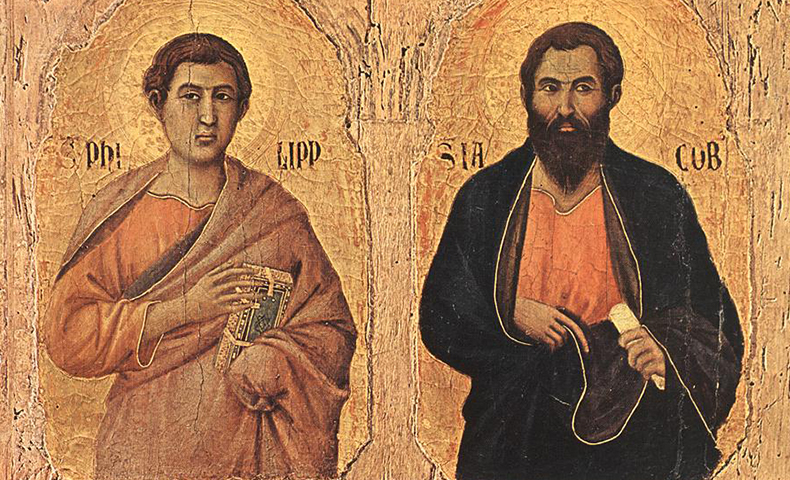
* * * *

As a Spiritual Exercise, back in 1989 I started looking for new ways to “help” my favorite college team – Florida State University – win its first football national championship… (The image at right shows the 1524 book, Spiritual Exercises of Ignatius of Loyola. I just used a different method.)
At first it was a matter of finding the right ritual sacrifice, in the form of exercise, and especially aerobics. (Initially a series of wind sprints over a 3-mile course; the goal was to finish the three miles in an ever-faster speed.)
It was only later – in the spring of 1992 – that I added the discipline of Daily Bible Reading. And just as an aside, during that next football season – in the fall of 1993, and after much drama, with twists and turns of fate – the Noles squeaked by Nebraska to win that first national title. (In a game they were expected to win easily.)

In the 27-plus years that followed – 30-plus, if you go back to 1989 – FSU football won two more national titles. (For a more complete listing of such “wins,” see On my “mission from God,” and “Unintended consequences” – and the search for Truth, including the image at left.) But there have been a number of heart-breaks as well, including losing the national-title game at the end of the 1996 season. (To our arch-rival Gators, no less.) And the past two seasons have been especially bad, with the Noles suffering back-to-back losing seasons.
On the other hand I’ve learned a lot of valuable spiritual lessons along the way.
Then too, this “spiritual exercise” has given me lots of insight into how the original Children of Israel must have felt when they did all the right things – and yet ended up conquered and sent into exile. (The functional equivalent of having back-to-back losing seasons for the first time in a dog’s years? And especially after establishing a 14-year college football dynasty?)
What brings all that to mind is the recent series of Daily Office Old Testament readings. Those recent Daily Office readings reminded me of all the twists and turns, the add-ons and “do not do” list of things that thwarted spiritual progress for Moses. And for his success on the field.
For example, that recent string of Daily Bible readings had a set rules and regulations – starting with Leviticus 8:1-13,30-36 – back on Sunday, May 10 (2020). And they’ve have been jumping around ever since. (After starting at Chapter 8 – and after leaving Exodus 40, 18 to 38, on Saturday the 9th – they jumped from 16 to 19 to 23, and so on, “to this day.” Exodus 40, for example, goes into great detail on “Setting Up the Tabernacle.”)

The point is that – over the past 30-plus years – I too have gleaned a number of “thou shalts” and “thou shalt nots.” (Not unlike those of Moses, set out in Leviticus.) Rules like “Thou shalt not listen to Panzerlied* on your iPod Shuffle in the days leading up to a game.” Or “thou shalt listen to ‘We Are the Champions‘ whenever it comes up, on your Shuffle or the radio.” (Because it brings good karma.) Also, “Thou shalt have thy monthly church-tithe check in the office safe before a game starts, at or near the first of the month.” And so on… Of course those rules haven’t guaranteed success, but neither did Moses’ rules and regulations, listed in Leviticus over the past weeks in the Daily Office.
So just like Moses – and especially like those who tried to follow his rules “to the letter” – for the past 31 years or so, I’ve been “working with God,” trying to get Him to help my teams win. But again, it hasn’t always worked out. And so you could easily say there have been far more disappointments and heartbreaks. On the other hand, by combining my Ritual Sacrifice with Daily Bible reading, I’ve learned some valuable spiritual lessons.
For one thing – again – I’ve experienced how those early Hebrews must have felt, when they thought they’d done everything right. But then – for whatever inexplicable reason – they were disappointed if not shocked by how bad things turned out. I’m sure they felt like saying to God, “You OWE me.” I did everything You asked, and this is how you treat me?” But along the way I’ve also learned – based on my experience – that there was and is some kind of causality at work. That is, some mysterious “Force” out there which (or Who) responded to my prayers and sacrifice, ritual or otherwise. Though many times not in the way I expected…
Another thing I’ve learned – over the past 31 years, and a host of both disappointments and triumphs. I’ve become convinced – by and through my day to day interactions with this “Force” – that the “factual accuracy” of the Bible is pretty much irrelevant to an advanced Christian faith. That is, to me, it doesn’t seem to matter if a so-called expert says he’s found the actual ark used by Noah somewhere in Turkey.
Or whether Jesus feeding the 5,000 is just a miracle, “taken only on faith,” or a parable whose lesson is that if we followed the example of Jesus, we could end world hunger “tomorrow.”
What matters is what you do with your faith and your life. What matters is how you follow the Bible, and in doing so follow the example of Jesus. And for that matter His disciples (including Paul, that “Johnny come lately” who wrote like a lawyer, with so many lawyer-like convolutions).
In other words if you work with this kind of “canary in a coal mine” spiritual exercise, you could end up with all the proof you need: That there is a God, and that “He” is willing to work with you, and that somewhere along the line, there’s a “happy ending…” And it can all come by and through the “spiritual discipline” of daily Bible reading, combined with your own version of a “canary-slash-coal-mine” way of keeping on the straight and narrow.
And incidentally (on a related note), next Thursday, May 21, is Ascension Day. For more on that feast day see 2014’s On Ascension Day and subsequent posts listed in the notes.
* * * *

* * * *
The upper image is courtesy of Spiritual Exercise – Image Results. Also, the image to the right of the first full paragraph refers to the “Spiritual Exercises of Ignatius of Loyola (Latin original: Exercitia spiritualia),” with the caption, “Exercitia spiritualia, 1548 First Edition by Antonio Bladio (Rome).”
A note on the post title. It’s similar in style to a Papal bull, that is, it’s “first few words of the text,” the incipit, i.e., “the first few Latin words from which the bull took its title for record keeping purposes, but which might not be directly indicative of the bull’s purpose.” See Wikipedia.
Re: Panzerlied. I first heard it in a 1965 film, see Battle of the Bulge (film) – Wikipedia. It’s a rousing song that goes well with road trips or picking up trash in a diesel-powered golf cart for the local branch of Keep America Beautiful. Unfortunately it has negative connotations having to do with the murder of “Jews, gypsies and fairies.” For more on the song see Wikipedia, or for a live version Panzerlied (Battle of the Bulge with english intro) – YouTube. For more on “Jews, gypsies and fairies,” see Slaughterhouse-Five Quotes | Shmoop: “The British had no way of knowing it, but the candles and the soap were made from the fat of rendered Jews and Gypsies and fairies and communists, and other enemies of the State. (5.14.4).”
See Thou Shalt Not – Image Results. And Thou Shalt Not (musical) – Wikipedia.
The causality image is courtesy of Causality – Image Results.
Re: Ascension Day. See also On Ascension Day 2015, Ascension Day and Pentecost – 2016, and Ascension Day 2017 – “Then He opened their minds.”
The lower image is courtesy of Canary Coal Mine – Image Results. This particular image accompanied an article, “Idioms in the news: Canary in the Coal Mine[,] ShareAmerica,” from November 2014: “Someone/something that is an early warning of danger.” An earlier image – “now defunct,” since the original post – was accompanied by an article, “I am the canary in the coal mine,” which also explained the idiom:
The tradition at that time – to foretell the toxic environment down in the [coal] mine – was for the miners to take a canary down with them on their daily journey… The canary is very susceptible to the toxic gases that were common in the mines, and would die when the gases were at a toxic level – signaling to the miners that they had to immediately exit.
See also canary in a coal mine – Wiktionary, about a thing sensitive to adverse conditions, which “makes it a useful early indicator of such conditions; something which warns of the coming of greater danger or trouble by a deterioration in its health or welfare.”
In my case, if I was doing something wrong in my daily life, a loss by FSU or “another team of mine” would indicate the need to stop doing that! (Not unlike the old Henny Youngman joke, where a patient says, “Doctor, it hurts when I do this.” To which the doctor replies, “Then don’t do that!” See Henry Youngman Jokes – Henry Youngman One Liners Jokes.)



